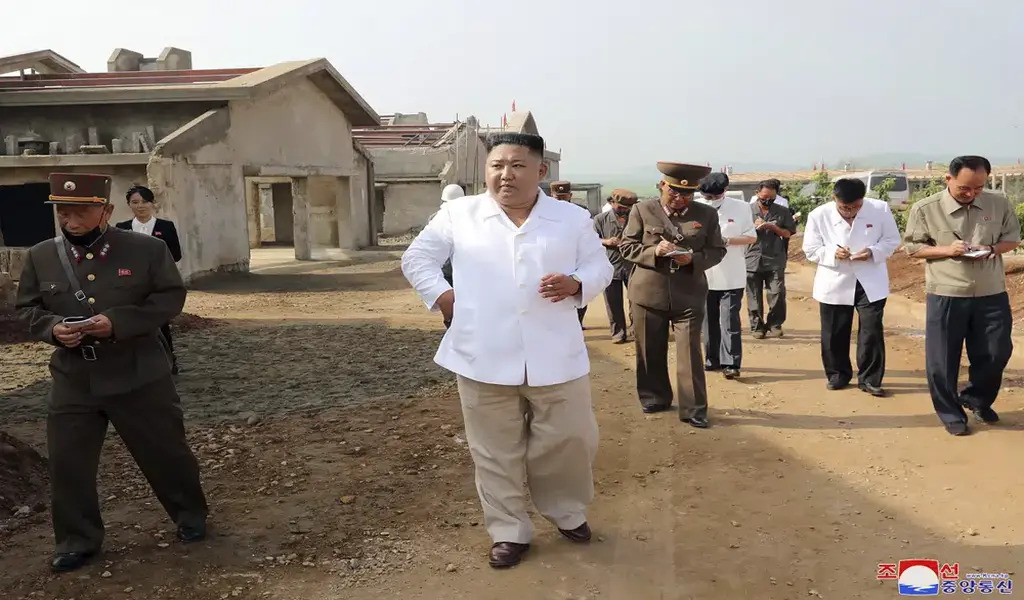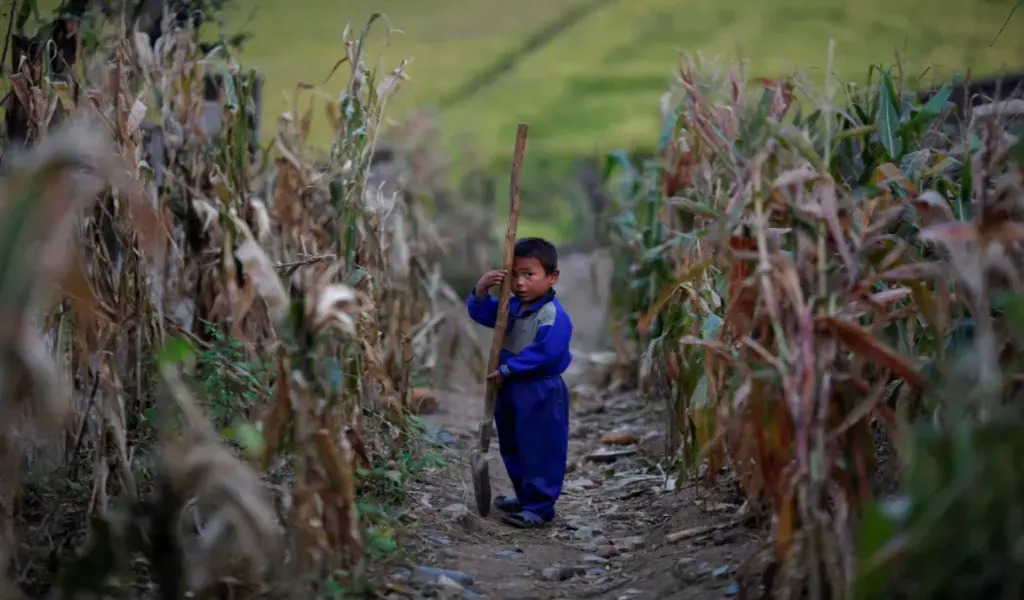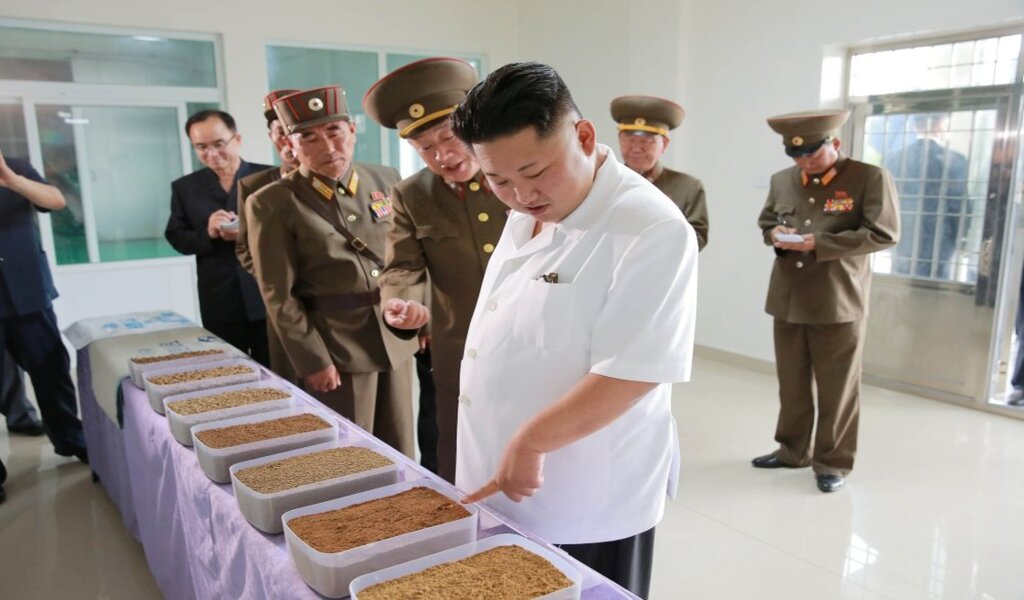News
North Korea Shows Signs Of Worsening Food Shortages During COVID

(CTN NEWS) – SEOUL – There is little question that the COVID-19 pandemic contributed to North Korea’s long-standing food shortages, and fears about the nation’s food security have grown as its senior authorities get ready to debate the “extremely important and urgent issue” of developing an appropriate agricultural policy.
Unverified sources claim that a certain number of North Koreans have been starving to death. But according to specialists, there are no indications of mass mortality or starvation.
They claim the next Workers’ Party gathering will likely be used to boost support for North Korean leader Kim Jong Un as he continues his nuclear weapons program despite severe pressure and sanctions from the United States.
In order to maintain public support, Kim Jong Un must seriously address the food crisis, according to Lim Eul-chul, a professor at Seoul’s Kyungnam University’s Institute for Far Eastern Studies.
The purpose of the gathering is to strengthen internal cohesion while brainstorming solutions to the food shortage.

(Korean Central News Agency/Korea News Service via AP, File)
The Workers’ Party Central Committee will hold an expanded plenary meeting in late February.
The party’s influential Politburo previously stated that “a turning moment is needed to dynamically push radical transformation in agricultural growth,” however it is unclear what its particular agenda would be.
Even though they are frequently a major topic at larger conferences in North Korea, this meeting will mark the party’s first plenary session that has been called just to tackle agricultural matters.
One of the 12 economic priorities the party adopted during a plenary conference in December was increasing grain output.
Knowing the real situation in the North is challenging because of how tightly its borders were shut during the outbreak.
Since the mid-1990s famine, which is estimated to have killed hundreds of thousands of people, food shortages and economic problems have persisted.
Kim promised North Koreans in his first speech since succeeding his father as leader in late 2011 that they would “never have to tighten their belts again.”

North Korean boy holds a spade in a corn field in area damaged by floods and typhoons in the Soksa-Ri collective farm in the South Hwanghae province, September 29, 2011 [File: Damir Sagolj/ Reuters]
North Korea Produced Around 4.5 Million Tonnes Of Grain Last Year
Kim allowed some market-oriented activities to continue during the first several years of his leadership, and he increased coal and other resource exports to China, the North’s key commercial partner, and ally.
But more lately, serious economic damage has been caused by harsher international sanctions over Kim Jong Un’s nuclear program, severe pandemic-related restrictions, and plain incompetence.
According to estimates from South Korea, North Korea produced around 4.5 million tonnes of grain last year, a 3.8% reduction from the previous year. Over the previous ten years, the annual grain output has stabilized at between 4.4 million and 4.8 million tonnes.
To feed its 25 million inhabitants, North Korea needs roughly 5.5 million tonnes of grain, thus it often falls short by about 1 million tonnes annually.
Unofficial grain purchases from China often cover around half of the gap. According to Kwon Tae-jin, a senior economist at the exclusive GS&J Institute in South Korea, the remaining shortage is still unsolved.
Kwon claims that the pandemic’s restrictions on cross-border trade have probably made it more difficult to make unauthorised purchases of rice from China.

/ GETTY IMAGE
The issue has gotten worse as a result of North Korean government efforts to tighten regulations and limit market activity, he claimed.
According to Kwon, this year marks North Korea’s worst food crisis since Kim Jong Un assumed power.
Unknown numbers of North Koreans have died from starvation, according to Koo Byoungsam, a spokesperson for the South Korean Unification Ministry, although the issue is not as severe as the mid-1990s famine.
Which was caused by natural catastrophes, the withdrawal of Soviet aid, and poor administration.
As a large portion of the grain harvested last year has not yet been consumed, the current food problem is more a distribution issue than a true lack of grain, according to ministry officials.
Since authorities tried to restrict the grain trade to state-run facilities and strengthened restrictions over private grain sales in markets, food poverty has gotten worse.
Analysts claim that the Kim government’s tough measures to contain the epidemic gave useful weapons for imposing a tighter grip on the kinds of market activity that had previously aided in stronger economic growth but would eventually weaken the government’s authoritarian leadership.

Although food is still readily available in markets, albeit at high prices, Kwon claimed that the current food shortages are unlikely to result in widespread mortality. Grain was difficult to find during the mid-1990s famine, he claimed.
The two most crucial necessities, rice and corn, have seen price rises, according to North Korean monitoring organizations, however, corn prices have lately steadied in some areas.
Ahn Kyung-su, the head of DPRKHEALTH.ORG, a website specializing in health issues in North Korea, asserted that “if North Korea actually sees people dying of hunger and faces a disarray, it won’t publicly declare things like ‘a very essential and urgent task’ for an agricultural program.”
The North’s plenary meeting, on top of the nuclear program and claims of a win over the pandemic, is “classic propaganda” designed to show Kim is working to improve living conditions and comes at a time when the leadership needs new material to burnish his image, Ahn added.
Kwon predicted at the plenary session that authorities will encourage regional farm officials to increase grain output without offering any viable solutions to the food crisis.

/ GETTY IMAGE
North Korea Acquired Significant Quantities Of Rice And Flour From China
If food shortages develop, targets will be set, and authorities can be penalized for failing to meet them, Ahn said.
North Korea recently acquired significant quantities of rice and flour from China, according to Yi Jisun, an analyst at the state-run Center for National Security Strategy in Seoul, though it is unlikely that it will accept food help from the United States, South Korea, or Japan.
The state-run media in the North has continued to promote its long-standing policy of “self-reliance,” a tactic that shuns Western assistance while claiming that food problems must be resolved at all costs.
The North’s leading newspaper, Rodong Sinmun, claimed in a commentary on Wednesday that imperialist assistance was “a trap for theft and subjugation meant to wrest 100 things after offering one.”
It would be folly to try to boost the economy by giving out this “poisoned candy.”
RELATED CTN NEWS:
China Plan’s to Stifle Elon Musk’s Starlink With 13,000 Satellites

News
Google’s Search Dominance Is Unwinding, But Still Accounting 48% Search Revenue

Google is so closely associated with its key product that its name is a verb that signifies “search.” However, Google’s dominance in that sector is dwindling.
According to eMarketer, Google will lose control of the US search industry for the first time in decades next year.
Google will remain the dominant search player, accounting for 48% of American search advertising revenue. And, remarkably, Google is still increasing its sales in the field, despite being the dominating player in search since the early days of the George W. Bush administration. However, Amazon is growing at a quicker rate.
Google’s Search Dominance Is Unwinding
Amazon will hold over a quarter of US search ad dollars next year, rising to 27% by 2026, while Google will fall even more, according to eMarketer.
The Wall Street Journal was first to report on the forecast.
Lest you think you’ll have to switch to Bing or Yahoo, this isn’t the end of Google or anything really near.
Google is the fourth-most valued public firm in the world. Its market worth is $2.1 trillion, trailing just Apple, Microsoft, and the AI chip darling Nvidia. It also maintains its dominance in other industries, such as display advertisements, where it dominates alongside Facebook’s parent firm Meta, and video ads on YouTube.
To put those “other” firms in context, each is worth more than Delta Air Lines’ total market value. So, yeah, Google is not going anywhere.
Nonetheless, Google faces numerous dangers to its operations, particularly from antitrust regulators.
On Monday, a federal judge in San Francisco ruled that Google must open up its Google Play Store to competitors, dealing a significant blow to the firm in its long-running battle with Fortnite creator Epic Games. Google announced that it would appeal the verdict.
In August, a federal judge ruled that Google has an illegal monopoly on search. That verdict could lead to the dissolution of the company’s search operation. Another antitrust lawsuit filed last month accuses Google of abusing its dominance in the online advertising business.
Meanwhile, European regulators have compelled Google to follow tough new standards, which have resulted in multiple $1 billion-plus fines.

Pixa Bay
Google’s Search Dominance Is Unwinding
On top of that, the marketplace is becoming more difficult on its own.
TikTok, the fastest-growing social network, is expanding into the search market. And Amazon has accomplished something few other digital titans have done to date: it has established a habit.
When you want to buy anything, you usually go to Amazon, not Google. Amazon then buys adverts to push companies’ products to the top of your search results, increasing sales and earning Amazon a greater portion of the revenue. According to eMarketer, it is expected to generate $27.8 billion in search revenue in the United States next year, trailing only Google’s $62.9 billion total.
And then there’s AI, the technology that (supposedly) will change everything.
Why search in stilted language for “kendall jenner why bad bunny breakup” or “police moving violation driver rights no stop sign” when you can just ask OpenAI’s ChatGPT, “What’s going on with Kendall Jenner and Bad Bunny?” in “I need help fighting a moving violation involving a stop sign that wasn’t visible.” Google is working on exactly this technology with its Gemini product, but its success is far from guaranteed, especially with Apple collaborating with OpenAI and other businesses rapidly joining the market.
A Google spokeswoman referred to a blog post from last week in which the company unveiled ads in its AI overviews (the AI-generated text that appears at the top of search results). It’s Google’s way of expressing its ability to profit on a changing marketplace while retaining its business, even as its consumers steadily transition to ask-and-answer AI and away from search.

Google has long used a single catchphrase to defend itself against opponents who claim it is a monopoly abusing its power: competition is only a click away. Until recently, that seemed comically obtuse. Really? We are going to switch to Bing? Or Duck Duck Go? Give me a break.
But today, it feels more like reality.
Google is in no danger of disappearing. However, every highly dominating company faces some type of reckoning over time. GE, a Dow mainstay for more than a century, was broken up last year and is now a shell of its previous dominance. Sears declared bankruptcy in 2022 and is virtually out of business. US Steel, long the foundation of American manufacturing, is attempting to sell itself to a Japanese corporation.
SOURCE | CNN
News
2024 | Supreme Court Won’t Hear Appeal From Elon Musk’s X Platform Over Warrant In Trump Case

Washington — Trump Media, The Supreme Court announced Monday that it will not hear an appeal from social media platform X about a search warrant acquired by prosecutors in the election meddling case against former President Donald Trump.
The justices did not explain their rationale, and there were no recorded dissents.
The firm, which was known as Twitter before being purchased by billionaire Elon Musk, claims a nondisclosure order that prevented it from informing Trump about the warrant obtained by special counsel Jack Smith’s team violated its First Amendment rights.
The business also claims Trump should have had an opportunity to exercise executive privilege. If not reined in, the government may employ similar tactics to intercept additional privileged communications, their lawyers contended.
Supreme Court Won’t Hear Appeal From Elon Musk’s X Platform Over Warrant In Trump Case
Two neutral electronic privacy groups also joined in, urging the high court to hear the case on First Amendment grounds.
Prosecutors, however, claim that the corporation never shown that Trump utilized the account for official purposes, therefore executive privilege is not a problem. A lower court also determined that informing Trump could have compromised the current probe.

Trump utilized his Twitter account in the weeks preceding up to his supporters’ attack on the Capitol on January 6, 2021, to spread false assertions about the election, which prosecutors claim were intended to create doubt in the democratic process.
The indictment describes how Trump used his Twitter account to encourage his followers to travel to Washington on Jan. 6, pressuring Vice President Mike Pence to reject the certification, and falsely claiming that the Capitol crowd, which battered police officers and destroyed glass, was peaceful.
Supreme Court Won’t Hear Appeal From Elon Musk’s X Platform Over Warrant In Trump Case
That case is now moving forward following the Supreme Court’s verdict in July, which granted Trump full immunity from criminal prosecution as a former president.
The warrant arrived at Twitter amid quick changes implemented by Musk, who bought the company in 2022 and has since cut off most of its workforce, including those dedicated to combating disinformation and hate speech.
SOURCE | AP
News
The Supreme Court Turns Down Biden’s Government Appeal in a Texas Emergency Abortion Matter.

(VOR News) – A ruling that prohibits emergency abortions that contravene the Supreme Court law in the state of Texas, which has one of the most stringent abortion restrictions in the country, has been upheld by the Supreme Court of the United States. The United States Supreme Court upheld this decision.
The justices did not provide any specifics regarding the underlying reasons for their decision to uphold an order from a lower court that declared hospitals cannot be legally obligated to administer abortions if doing so would violate the law in the state of Texas.
Institutions are not required to perform abortions, as stipulated in the decree. The common populace did not investigate any opposing viewpoints. The decision was made just weeks before a presidential election that brought abortion to the forefront of the political agenda.
This decision follows the 2022 Supreme Court ruling that ended abortion nationwide.
In response to a request from the administration of Vice President Joe Biden to overturn the lower court’s decision, the justices expressed their disapproval.
The government contends that hospitals are obligated to perform abortions in compliance with federal legislation when the health or life of an expectant patient is in an exceedingly precarious condition.
This is the case in regions where the procedure is prohibited. The difficulty hospitals in Texas and other states are experiencing in determining whether or not routine care could be in violation of stringent state laws that prohibit abortion has resulted in an increase in the number of complaints concerning pregnant women who are experiencing medical distress being turned away from emergency rooms.
The administration cited the Supreme Court’s ruling in a case that bore a striking resemblance to the one that was presented to it in Idaho at the beginning of the year. The justices took a limited decision in that case to allow the continuation of emergency abortions without interruption while a lawsuit was still being heard.
In contrast, Texas has been a vocal proponent of the injunction’s continued enforcement. Texas has argued that its circumstances are distinct from those of Idaho, as the state does have an exemption for situations that pose a significant hazard to the health of an expectant patient.
According to the state, the discrepancy is the result of this exemption. The state of Idaho had a provision that safeguarded a woman’s life when the issue was first broached; however, it did not include protection for her health.
Certified medical practitioners are not obligated to wait until a woman’s life is in imminent peril before they are legally permitted to perform an abortion, as determined by the state supreme court.
The state of Texas highlighted this to the Supreme Court.
Nevertheless, medical professionals have criticized the Texas statute as being perilously ambiguous, and a medical board has declined to provide a list of all the disorders that are eligible for an exception. Furthermore, the statute has been criticized for its hazardous ambiguity.
For an extended period, termination of pregnancies has been a standard procedure in medical treatment for individuals who have been experiencing significant issues. It is implemented in this manner to prevent catastrophic outcomes, such as sepsis, organ failure, and other severe scenarios.
Nevertheless, medical professionals and hospitals in Texas and other states with strict abortion laws have noted that it is uncertain whether or not these terminations could be in violation of abortion prohibitions that include the possibility of a prison sentence. This is the case in regions where abortion prohibitions are exceedingly restrictive.
Following the Supreme Court’s decision to overturn Roe v. Wade, which resulted in restrictions on the rights of women to have abortions in several Republican-ruled states, the Texas case was revisited in 2022.
As per the orders that were disclosed by the administration of Vice President Joe Biden, hospitals are still required to provide abortions in cases that are classified as dire emergency.
As stipulated in a piece of health care legislation, the majority of hospitals are obligated to provide medical assistance to patients who are experiencing medical distress. This is in accordance with the law.
The state of Texas maintained that hospitals should not be obligated to provide abortions throughout the litigation, as doing so would violate the state’s constitutional prohibition on abortions. In its January judgment, the 5th United States Circuit Court of Appeals concurred with the state and acknowledged that the administration had exceeded its authority.
SOURCE: AP
SEE ALSO:
Could Last-Minute Surprises Derail Kamala Harris’ Campaign? “Nostradamus” Explains the US Poll.
-

 News4 years ago
News4 years agoLet’s Know About Ultra High Net Worth Individual
-
Entertainment3 years ago
Mabelle Prior: The Voice of Hope, Resilience, and Diversity Inspiring Generations
-
News11 years ago
Enviromental Groups Tell Mekong Leaders Lao Dam Evaluation Process Flawed
-

 Health4 years ago
Health4 years agoHow Much Ivermectin Should You Take?
-

 Tech3 years ago
Tech3 years agoTop Forex Brokers of 2023: Reviews and Analysis for Successful Trading
-

 Lifestyles3 years ago
Lifestyles3 years agoAries Soulmate Signs
-

 Entertainment3 years ago
Entertainment3 years agoWhat Should I Do If Disney Plus Keeps Logging Me Out of TV?
-

 Health4 years ago
Health4 years agoCan I Buy Ivermectin Without A Prescription in the USA?


